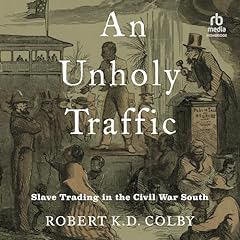
Black Slaves, Indian Masters
Slavery, Emancipation, and Citizenship in the Native American South
Failed to add items
Add to Cart failed.
Add to Wish List failed.
Remove from wishlist failed.
Adding to library failed
Follow podcast failed
Unfollow podcast failed
 Prime members: New to Audible?
Prime members: New to Audible?Get 2 free audiobooks during trial.
Buy for $19.10
-
Narrated by:
-
Mia Ellis
From the late eighteenth century through the end of the Civil War, Choctaw and Chickasaw Indians bought, sold, and owned Africans and African Americans as slaves, a fact that persisted after the tribes' removal from the Deep South to Indian Territory. The tribes formulated racial and gender ideologies that justified this practice and marginalized free black people in the Indian nations well after the Civil War and slavery had ended. Through the end of the nineteenth century, ongoing conflicts among Choctaw, Chickasaw, and U.S. lawmakers left untold numbers of former slaves and their descendants in the two Indian nations without citizenship in either the Indian nations or the United States. In this groundbreaking study, Barbara Krauthamer rewrites the history of southern slavery, emancipation, race, and citizenship to reveal the centrality of Native American slaveholders and the black people they enslaved.
Krauthamer's examination of slavery and emancipation highlights the ways Indian women's gender roles changed with the arrival of slavery and changed again after emancipation and reveals complex dynamics of race that shaped the lives of black people and Indians both before and after removal.
©2013 The University of North Carolina Press (P)2022 TantorListeners also enjoyed...




















People who viewed this also viewed...














the history
Something went wrong. Please try again in a few minutes.
The government actions and roles in the lives of both cultures.
Something went wrong. Please try again in a few minutes.
Indians and brown people
Something went wrong. Please try again in a few minutes.
excellent
Something went wrong. Please try again in a few minutes.
The information that has not been told.
Something went wrong. Please try again in a few minutes.


